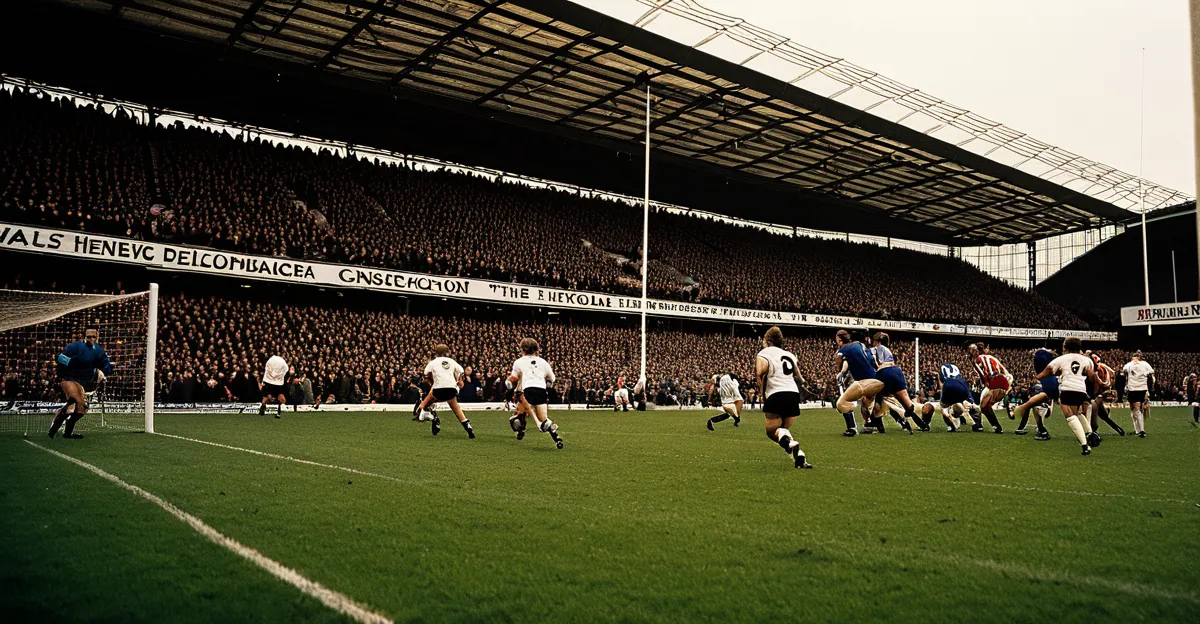Overview of Historical Milestones in UK Sports
The evolution of sports in the UK has a deep and storied past, with several milestones marking its rich tapestry. This evolution is a timeline that maps the origins, transformations, and societal impacts of major sports. Let’s delve into some significant milestones that highlight the journey of UK sports history.
One of the earliest traces of organized sports in the UK is the advent of football, a game with roots dating back to medieval times. This sport, initially played in different forms across the country, gradually formalized rules in the late 19th century, leading to the establishment of the Football Association in 1863. This was a pivotal moment, shaping not only domestic but international iterations of the game.
This might interest you : What Makes UK Sports a Crucial Part of National Identity?
Cricket, another cornerstone of UK sports history, boasts beginnings from as early as the 16th century. The Marylebone Cricket Club (MCC) was founded in 1787, which led to standardization and global expansion. Legislative changes like the “overarm” bowling law in 1864 were critical in its development, solidifying cricket’s role as a quintessential part of British culture.
Rugby evolved distinctly due to socio-economic influences, with its division into rugby union and rugby league in 1895 marking a significant economic split within the game. The divergence was a result of differences in class-related professionalization, yet both forms have contributed richly to the national identity.
Additional reading : How Has Social Media Transformed the Coverage of UK Sports?
In addition to team sports, individual sports have also left a lasting mark. Tennis, particularly through the prestigious Wimbledon Championships, has been a British staple since 1877, highlighting the UK’s influential role in shaping global tennis culture.
Understanding these historical milestones not only maps the timeline of UK sports history but also illuminates how legislative changes, cultural shifts, and socio-economic factors have played considerable roles in molding the landscape of sports in the UK. These milestones reflect shifts in societal attitudes towards inclusivity and professionalism, contributing to the vibrant and diverse sports culture seen today.
The Emergence of Team Sports
Team sports have been integral to the historical milestones in UK sports, shaping the cultural tapestry and identity of the nation. From football to cricket and rugby, the evolution of sports in the UK reflects its societal values and historical contexts.
The Rise of Football
Football’s origins in the UK trace back to medieval times, evolving into a structured sport by the late 19th century. This led to the establishment of influential leagues and governance bodies such as the Football Association. Football is renowned for its cultural impact on UK society, fostering community spirit and local pride across regions. The sport not only bridges social divides but also serves as a platform for significant cultural expression and identity.
Cricket’s Development
Rooted in historical landmarks, cricket in the UK dates back to the 16th century. Key legislative changes, such as the “overarm” bowling law, significantly altered the game’s trajectory, promoting fair play and professionalism. Cricket occupies a central position within British culture, revered as both a pastime and a prestigious tradition. Its impact extends beyond the playing field, influencing international diplomacy and sportsmanship ideals.
Rugby’s Growth and Impact
The origins and evolution of rugby in the UK highlight the influence of socio-economic factors and class dynamics. The sport’s division into rugby union and rugby league exemplifies how economic and social class shaped its development. Rugby contributes significantly to the national identity, fostering a sense of camaraderie and tradition. Its role in promoting teamwork and resilience remains a proud aspect of British sporting culture.
Individual Sports That Shaped UK Culture
The legacy of sports in the UK isn’t solely built on team sports. Individual sports play a significant role in shaping cultural identity and international reputation. Exploring the rich history of some key individual sports provides insight into how they have influenced British culture and inspired generations of athletes.
Tennis and Wimbledon Tradition
Tennis has long been a cherished sport in the UK, gaining prestige with the establishment of the Wimbledon Championships in 1877. This tournament has evolved into a globally celebrated event, renowned for its tradition and excellence. Wimbledon’s grass courts and strict dress codes highlight the blend of tradition and modernity, standing as a symbol of British sportsmanship and elegance. Notable athletes such as Fred Perry and Virginia Wade have left an indelible mark on the sport, contributing to its global acclaim. Their achievements continue to inspire upcoming talents, reinforcing tennis’ status as a crucial element of British sports heritage.
Athletics and Olympic Influence
The UK’s participation in the modern Olympic Games underscores its commitment to athletics and international competition. Figures like Sir Roger Bannister, who famously broke the four-minute mile, exemplify British tenacity and innovation in athletics. These athletes not only achieve personal milestones but also serve as beacons of perseverance, influencing the broader sports culture. Their legacies promote youth engagement in athletics, encouraging a focus on fitness and determination.
The Evolution of Boxing in the UK
Boxing, with deep roots in the UK’s sporting history, has produced iconic fighters whose legacies extend beyond the ring. Historical figures such as Henry Cooper and Lennox Lewis are celebrated for their prowess and sportsmanship. Boxing’s popularity persists, partly due to its strong cultural and social associations, offering a platform for individuals from diverse backgrounds to excel. However, it also prompts discussions on social issues such as violence and class disparities, reflecting broader societal challenges and the sport’s complex role within UK society.
Social, Economic, and Political Influences on UK Sports
The evolution of sports in the UK has been deeply affected by social, economic, and political forces, shaping the landscape in profound ways. Understanding these influences provides key insights into the current state of sports and their accessibility and development across the nation.
Socio-economic status has significantly impacted sports accessibility in the UK. The affordability of participation can restrict or enable involvement, particularly in historically expensive or elite sports such as tennis and polo. Economic disparities may limit opportunities for talented individuals from disadvantaged backgrounds, though initiatives aimed at leveling the playing field have gained momentum in recent years.
Government policies play a crucial role in the development of sports. Initiatives supporting grassroots sports, infrastructure investment, and funding for community projects have enhanced participation and performance levels. Policies promoting inclusivity and diversity are actively reshaping the diversity of sports participants and audiences, pushing towards a more comprehensive representation within the sporting community.
Political events have also left indelible marks on sports culture. For instance, London’s successful bid to host the 2012 Olympic Games not only bolstered international prestige but also reignited public enthusiasm for athletics. Political climates influence funding allocations and policy directions, impacting everything from youth sports programs to facilities maintenance.
These elements collectively color the tapestry of UK sports, where social, economic, and political dynamics continuously mold the opportunities, challenges, and aspirations within the sporting realm. Recognizing these influences helps to address barriers to access and fosters a more inclusive sporting environment.
Recognizing Influential Figures in UK Sports History
Understanding the trajectory of UK sports history is incomplete without acknowledging its influential athletes and the people who were pivotal in shaping this illustrious journey. These figures, encompassing players, coaches, and pioneers, have each left an indelible mark on the sports they represented.
Pioneers of UK Sports
The early landscape of UK sports was shaped significantly by pioneering figures who laid the groundwork for its current form. Notable early figures include William Webb Ellis in rugby, known for supposedly picking up the ball and running with it, thus setting the foundation for rugby as we know it. Figures like Sir Thomas Lord revolutionized cricket with the establishment of Lord’s Cricket Ground, the spiritual home of cricket. Women also played a pivotal role, with athletes like Lottie Dod in tennis and hockey breaking barriers and setting standards for women in sports during the late 19th and early 20th centuries.
Modern Legends
The contemporary sports scene in the UK is graced by iconic athletes whose careers have transcended sporting arenas to influence broader societal issues. Figures such as David Beckham in football have not only excelled on the field but also significantly impacted youth engagement and sports culture worldwide. Paula Radcliffe‘s achievements in athletics have inspired a generation of runners and enhanced awareness about fitness and health. Their legacies, enriched by accolades and humanitarian efforts, continue to inspire future generations and ensure that the UK remains a hub of sporting innovation and excellence.
Future Trends and Continuing Legacy of UK Sports
In assessing the future of sports in the UK, numerous emerging trends and evolving cultural dynamics are shaping its trajectory. The legacy of UK sports history continues to influence modern sports, while innovations introduce new possibilities.
Emerging Sports and Changing Dynamics
With shifting societal interests, sports like esports are gaining traction, reflecting a move towards digital engagement. Traditional sports are adapting to remain relevant, with inclusivity driving participation across genders and communities. As societal values evolve, so do competitive sports, accommodating diverse preferences and identities.
The Role of Technology
Technological advancements are revolutionizing sports by enhancing performance and accessibility. Wearable tech optimises training, while virtual reality and AI provide unparalleled analytics. These innovations not only improve athlete performance but also enhance spectator experiences, bridging the gap between fans and the action.
Predictions for the Future
Drawing from historical patterns, we anticipate that UK sports will continue to embrace inclusivity and innovation. This involves integrating technology, fostering grassroots participation, and celebrating diverse athletic prowess. As UK sports history has shown resilience and adaptability, the future promises exciting shifts, dedicated to preserving tradition while embracing modernity.











